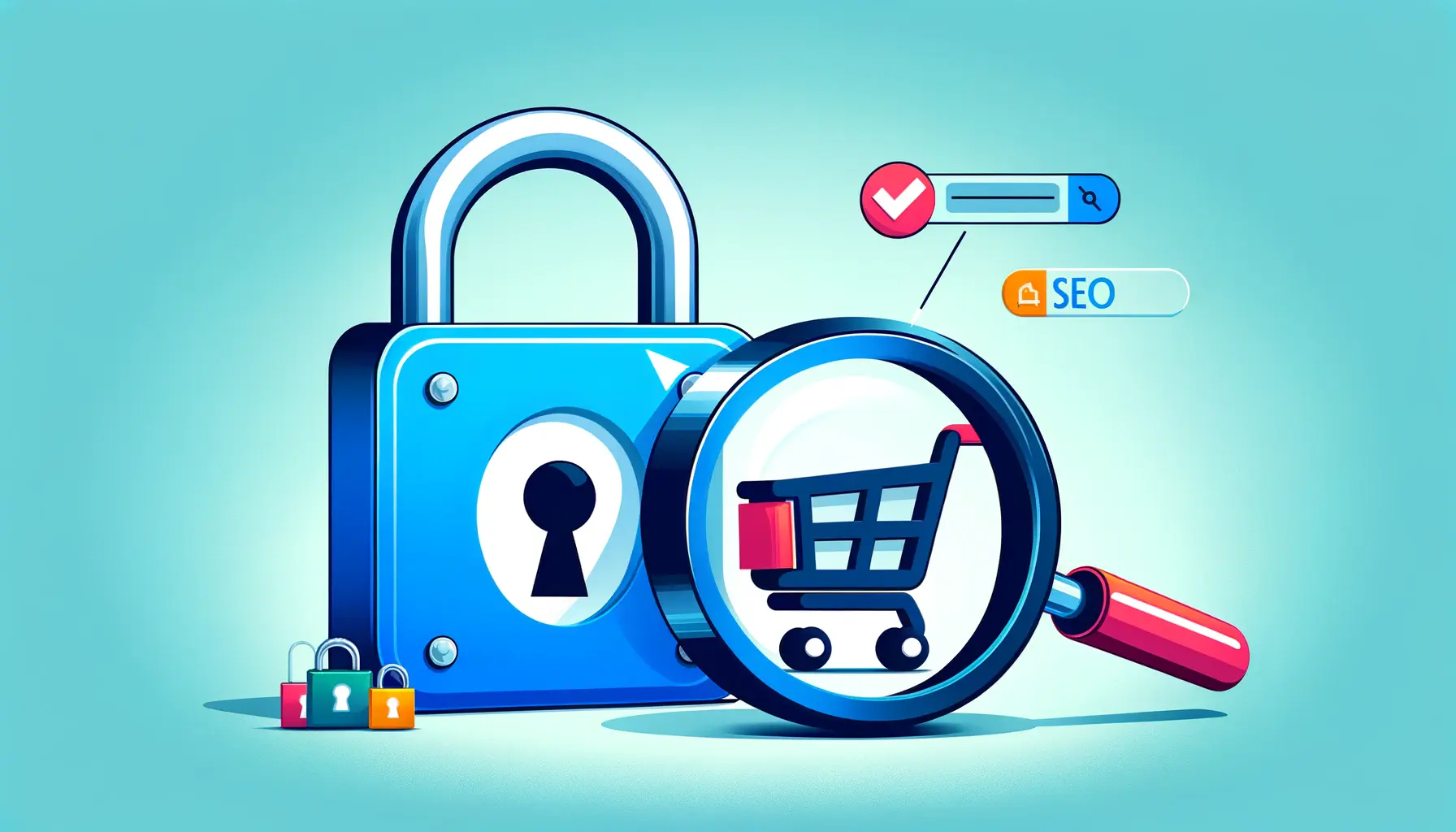As the digital marketplace continues to expand, the intersection of ecommerce security and search engine optimization (SEO) has become a pivotal focus for online retailers.
Ensuring the security of an ecommerce platform is not just about protecting data and transactions; it’s also about building trust with customers and search engines alike.
This trust, in turn, significantly impacts a site’s SEO performance and its ability to attract and retain customers.
In the realm of online retail, security measures are no longer optional but a necessity.
These measures not only safeguard against potential threats but also enhance the site’s credibility and reliability in the eyes of both users and search engines.
As such, implementing robust security protocols is a strategic approach to improving an ecommerce site’s SEO ranking, driving more traffic, and ultimately, increasing sales.
- Understanding the Role of Security in Ecommerce SEO
- Implementing Secure Payment Gateways
- Optimizing Site Speed and Security
- Regular Security Audits and Updates
- Enhancing User Experience with Security
- Creating Quality Content with Security in Mind
- Engaging in Ethical SEO Practices
- Securing the Future of Ecommerce SEO
- FAQs on Security Measures to Enhance Ecommerce SEO
Understanding the Role of Security in Ecommerce SEO
Security plays a critical role in the SEO of ecommerce websites.
Search engines prioritize sites that offer a secure browsing experience, marking HTTPS as a ranking signal.
This emphasis on security means that ecommerce sites must adopt SSL certificates to encrypt data transferred between the user and the server.
By doing so, they not only protect sensitive customer information but also boost their SEO performance.
Moreover, the presence of security measures like HTTPS is often highlighted in search engine results pages (SERPs), reassuring users of the site’s safety.
This increased user trust can lead to higher click-through rates (CTRs), further improving the site’s SEO ranking.
Additionally, a secure site is less likely to suffer from hacking incidents that can result in penalties from search engines or a loss of customer trust, both of which can negatively impact SEO.
SSL Certificates and SEO
Implementing SSL certificates is the first step towards securing an ecommerce site and enhancing its SEO.
SSL certificates encrypt the data exchange between a user’s browser and the ecommerce site, ensuring that sensitive information like credit card details and personal information is protected.
This encryption is crucial for maintaining customer trust and loyalty, as users are more likely to engage with and purchase from sites that they perceive as secure.
From an SEO perspective, search engines like Google have explicitly stated that the use of HTTPS is a ranking signal.
This means that ecommerce sites with SSL certificates may receive a ranking boost over those without.
The visual indicators of a secure connection, such as the padlock icon in the browser address bar, also reassure users about the site’s security, potentially increasing the site’s CTR and contributing to higher search rankings.
Adopting SSL certificates is a fundamental security measure that benefits both the user’s safety and the ecommerce site’s SEO performance.
Implementing Secure Payment Gateways
For ecommerce sites, the security of payment transactions is paramount.
Not only does it protect customers’ financial information, but it also influences the site’s reputation and SEO.
Secure payment gateways are essential for encrypting payment information, reducing the risk of fraud, and enhancing customer trust.
Choosing the right payment gateway involves evaluating its security features, such as PCI DSS compliance, which ensures that the payment gateway adheres to the highest security standards.
Additionally, offering multiple secure payment options can improve the user experience, potentially increasing conversion rates and positively impacting SEO through improved user engagement metrics.
Benefits of Secure Payment Gateways for SEO
- Enhanced Trust: Secure payment options signal to customers and search engines that the ecommerce site is trustworthy, potentially leading to higher SERP rankings.
- Lower Bounce Rates: By providing a secure and seamless checkout process, ecommerce sites can reduce bounce rates, a factor that search engines consider when ranking sites.
- Improved Conversion Rates: Secure and user-friendly payment options can lead to higher conversion rates, indirectly benefiting SEO by demonstrating to search engines that the site offers a valuable user experience.
Choosing the Right Payment Gateway
Selecting a payment gateway with robust security features is crucial for ecommerce sites.
Look for gateways that offer end-to-end encryption, fraud detection tools, and are compliant with international security standards like PCI DSS.
Additionally, consider the user experience by selecting gateways that support a wide range of payment methods and currencies, catering to a global audience.
Integrating secure payment gateways not only fortifies the ecommerce site against data breaches but also supports SEO efforts by building trust with both users and search engines.
This trust, reflected in user behavior and engagement metrics, can translate into better search rankings and increased visibility for the ecommerce site.
Secure payment gateways contribute to both the security and SEO of ecommerce sites by enhancing user trust and engagement.
Optimizing Site Speed and Security
Site speed is a critical factor in both user experience and SEO.
Ecommerce sites must ensure fast loading times to keep customers engaged and reduce bounce rates.
However, security measures, while essential, can sometimes impact site speed.
Balancing security protocols with site performance is crucial for maintaining optimal SEO rankings.
Implementing efficient security measures that do not overly burden site speed involves choosing lightweight security plugins, optimizing images and content, and using content delivery networks (CDNs) to reduce load times.
These practices ensure that the ecommerce site remains secure without sacrificing user experience.
Strategies for Balancing Security and Site Speed
- Use Content Delivery Networks (CDNs): CDNs can help distribute the load, ensuring faster content delivery and improved site speed while also providing additional security benefits such as DDoS protection.
- Optimize Images and Content: Reducing file sizes without compromising quality can significantly improve loading times, enhancing the user experience and SEO.
- Select Lightweight Security Plugins: Choose security plugins that offer robust protection without slowing down the site. Regularly update and audit plugins to ensure they remain efficient and secure.
Impact of Site Speed on SEO
Search engines, particularly Google, use site speed as a ranking factor.
Faster sites provide a better user experience, leading to higher engagement rates, lower bounce rates, and improved SEO rankings.
Ecommerce sites must monitor their speed regularly, using tools like Google’s PageSpeed Insights to identify and address any issues that could impact performance and, by extension, SEO.
By optimizing both security and site speed, ecommerce sites can enhance their SEO performance.
This dual focus ensures that the site not only ranks well in search engine results but also provides a safe and efficient shopping experience for customers.
Balancing site speed and security is essential for ecommerce SEO, requiring a strategic approach to optimize both without compromising on either.
Regular Security Audits and Updates
Regular security audits are crucial for identifying vulnerabilities within an ecommerce platform.
These audits help in pinpointing potential security threats and areas for improvement.
By conducting these assessments routinely, ecommerce sites can ensure their defenses are up-to-date and effective against the latest cyber threats, thereby safeguarding user data and enhancing site integrity.
Updates play a pivotal role in maintaining site security.
Software, plugins, and security protocols that are out-of-date become prime targets for cyberattacks.
Ecommerce platforms must prioritize regular updates to their systems, including the application of patches and security fixes, to protect against vulnerabilities and maintain compliance with SEO best practices.
Implementing a Robust Security Framework
- Conduct Regular Security Audits: Utilize tools and services to perform comprehensive security checks, identifying vulnerabilities and areas for improvement.
- Update and Patch Regularly: Keep all software, including CMS, plugins, and themes, updated with the latest security patches to close any vulnerabilities.
- Monitor for Security Threats: Use security monitoring tools to continuously watch for unusual activities or potential breaches, allowing for immediate response.
The SEO Benefits of a Secure Site
A secure ecommerce site not only protects customer data but also significantly impacts its SEO rankings.
Search engines favor websites that are deemed safe, rewarding them with higher rankings in search results.
Regular security audits and timely updates contribute to this perception of safety, enhancing the site’s SEO performance.
Moreover, a secure site fosters trust among users, leading to increased engagement and lower bounce rates, further boosting SEO.
Ultimately, the commitment to regular security audits and updates is a testament to an ecommerce platform’s dedication to protecting its users.
This dedication not only enhances the site’s security posture but also its SEO performance, creating a safer and more discoverable online shopping environment.
A proactive approach to security through regular audits and updates is essential for maintaining both the safety and SEO performance of an ecommerce site.
Enhancing User Experience with Security
User experience (UX) is a critical component of ecommerce success, directly influencing conversion rates, customer loyalty, and SEO rankings.
A secure ecommerce environment enhances UX by ensuring customer data protection, secure transactions, and a trustworthy site interface.
This security-centric approach to UX not only protects users but also positively impacts the site’s SEO performance by increasing user engagement and trust.
Integrating security seamlessly into the user experience involves clear communication of security measures, the use of SSL certificates for data encryption, and ensuring a smooth, secure checkout process.
These elements contribute to a positive shopping experience, encouraging repeat visits and positive user interactions, which are beneficial for SEO.
Security as a Component of UX Design
- Transparent Security Policies: Clearly communicate your site’s security measures to users, including data protection practices and secure payment processes.
- Seamless Secure Checkout: Optimize the checkout process with secure payment gateways and minimal steps, reducing cart abandonment rates.
- User Data Protection: Implement robust data protection measures, such as encryption and secure data storage, to safeguard user information.
Impact on SEO and Customer Trust
A secure and user-friendly ecommerce site fosters customer trust, a crucial factor for online businesses.
Trust influences not only purchase decisions but also the likelihood of customers recommending the site to others, directly affecting the site’s reputation and SEO.
Search engines prioritize sites that offer a secure and positive user experience, leading to higher rankings in search results.
Furthermore, a focus on security within UX design can differentiate an ecommerce site from competitors, making it more appealing to both users and search engines.
By prioritizing security within the user experience, ecommerce sites can achieve a delicate balance between protecting users and providing a seamless shopping experience.
This balance is key to enhancing site usability, customer satisfaction, and SEO performance, ultimately contributing to the site’s success in the competitive online marketplace.
Integrating security into the user experience is essential for building customer trust and improving SEO performance.
Creating Quality Content with Security in Mind
Content is king in the digital marketing world, and its quality directly impacts ecommerce SEO performance.
However, creating content with security in mind goes beyond just producing engaging and informative material.
It involves ensuring that the content delivery mechanisms are secure, protecting both the site and its users from potential security threats.
This approach not only enhances the site’s SEO but also builds trust with its audience.
Secure content strategies include using HTTPS for all pages, ensuring that embedded media such as videos and images are sourced from secure locations, and protecting user-generated content through moderation and anti-spam measures.
These practices help maintain the integrity of the ecommerce site, making it a safe place for users to interact and transact.
Secure Content Delivery
- HTTPS for All Pages: Encrypt the entire site with HTTPS, not just the checkout process, to protect users’ data across all interactions.
- Secure Embedded Media: Ensure that all embedded content, such as images and videos, is hosted on secure platforms and served over HTTPS.
- User-Generated Content Protection: Implement moderation tools and anti-spam measures to safeguard the site from malicious content and maintain a positive user experience.
Boosting SEO Through Secure Content Practices
Search engines favor websites that provide a secure environment for their users.
By implementing secure content delivery practices, ecommerce sites can improve their SEO rankings.
Secure sites are seen as more trustworthy and reliable, leading to better search engine visibility.
Additionally, a secure site is less likely to be compromised, ensuring that its content remains accessible and unaltered, further supporting SEO efforts.
Creating quality content with security in mind is a proactive approach to ecommerce SEO.
It not only enhances the site’s search engine rankings but also protects the brand’s reputation and fosters trust among its audience.
This trust is crucial for converting visitors into loyal customers and advocates for the brand.
Secure content practices are essential for maintaining the integrity of ecommerce sites and enhancing their SEO performance.
Engaging in Ethical SEO Practices
In the pursuit of higher rankings and increased visibility, ecommerce sites must adhere to ethical SEO practices.
These practices not only ensure compliance with search engine guidelines but also contribute to building a secure and trustworthy online environment.
Ethical SEO involves optimizing content, improving site speed, and ensuring mobile responsiveness without resorting to manipulative tactics that could compromise user security.
Engaging in ethical SEO means focusing on long-term strategies such as creating high-quality content, securing the site against potential threats, and providing an excellent user experience.
These practices not only align with search engine optimization guidelines but also enhance site security, protecting both the business and its customers from cyber threats.
Key Components of Ethical SEO
- Quality Content Creation: Produce original, informative, and engaging content that adds value to the user’s experience.
- Site Security Measures: Implement SSL certificates, secure payment gateways, and regular security audits to protect user data.
- User Experience Optimization: Ensure the site is easy to navigate, loads quickly, and is accessible on various devices and browsers.
The Impact of Ethical SEO on Site Security and Performance
Adhering to ethical SEO practices has a direct impact on site security and overall performance.
By focusing on creating a secure and user-friendly environment, ecommerce sites can improve their search engine rankings and attract more organic traffic.
Ethical SEO practices foster trust among users, encouraging them to engage more with the site and complete transactions securely.
This trust, in turn, signals to search engines that the site is a reliable and valuable resource, further boosting its SEO performance.
Ultimately, engaging in ethical SEO practices is essential for the long-term success of ecommerce sites.
It ensures that the site not only ranks well in search engine results but also provides a safe and positive experience for users.
This approach to SEO fosters a sustainable online presence, building a loyal customer base and enhancing the site’s reputation in the digital marketplace.
Ethical SEO practices are crucial for maintaining site security, enhancing user trust, and achieving sustainable SEO success.
Securing the Future of Ecommerce SEO
In the rapidly evolving digital marketplace, the integration of security measures into ecommerce SEO strategies has emerged as a cornerstone for building trust, enhancing user experience, and achieving sustainable growth.
As online threats become more sophisticated, the importance of adopting a security-first approach in ecommerce cannot be overstated.
This article has explored various dimensions of how security measures not only protect but also significantly enhance ecommerce SEO, underscoring the symbiotic relationship between these two critical aspects of online retail.
The Pillars of a Secure and Optimized Ecommerce Experience
From implementing SSL certificates to engaging in ethical SEO practices, the journey towards a secure and optimized ecommerce platform is multifaceted.
Each strategy discussed serves as a pillar supporting the overarching goal of creating a safe, user-friendly, and search engine-optimized online environment.
These practices are not just about adhering to guidelines or bolstering security protocols; they are about fostering a culture of trust and reliability that resonates with users and search engines alike.
Key Takeaways for Ecommerce Success
- User Trust is Paramount: At the heart of a successful ecommerce SEO strategy lies the trust of its users. Secure payment gateways, regular security audits, and transparent communication of security measures are essential for building and maintaining this trust.
- Security Enhances SEO: Search engines favor secure websites. By integrating security measures such as HTTPS and secure content delivery, ecommerce sites can improve their SEO rankings, driving more organic traffic and increasing visibility.
- Content is the Bridge: Quality content that is securely delivered not only engages users but also safeguards them from potential security threats. This content strategy enhances the site’s SEO performance while ensuring a safe browsing experience.
- Ethical SEO Practices are Crucial: Adhering to ethical SEO practices ensures long-term success. These practices enhance site security, improve user experience, and align with search engine guidelines, contributing to higher rankings and increased traffic.
In conclusion, the integration of security measures into ecommerce SEO is not just a best practice; it is a necessity in today’s digital landscape.
By prioritizing security, ecommerce platforms can ensure a positive user experience, build lasting trust, and achieve higher search engine rankings.
The future of ecommerce SEO is secure, optimized, and user-focused, paving the way for a thriving online marketplace that benefits businesses and consumers alike.
Want your website to top Google search rankings? Leave the SEO to our professional agency!
FAQs on Security Measures to Enhance Ecommerce SEO
Explore common queries about integrating security measures into your ecommerce SEO strategy to protect your online store and boost its visibility.
SSL certification encrypts data between the server and user, enhancing site security and trust, which are key factors in improving ecommerce SEO rankings.
Secure payment gateways protect customer data during transactions, significantly boosting user trust and potentially increasing conversion rates and SEO performance.
Yes, site speed directly impacts user experience and SEO. Faster sites reduce bounce rates and improve rankings, while security measures ensure safe browsing.
Regular security audits identify vulnerabilities, ensuring the ecommerce platform remains secure and trustworthy, positively influencing its SEO rankings.
A secure site enhances user experience by ensuring data protection and smooth transactions, which can lead to better engagement and improved SEO outcomes.
Content security prevents unauthorized access and ensures safe delivery, maintaining the integrity of the site and fostering trust, crucial for SEO success.
Ethical SEO practices involve optimizing the site without compromising security, focusing on long-term growth and maintaining a secure environment for users.
Improving security measures safeguards the site from threats, builds user trust, and signals to search engines that the site is reliable, enhancing its visibility.












